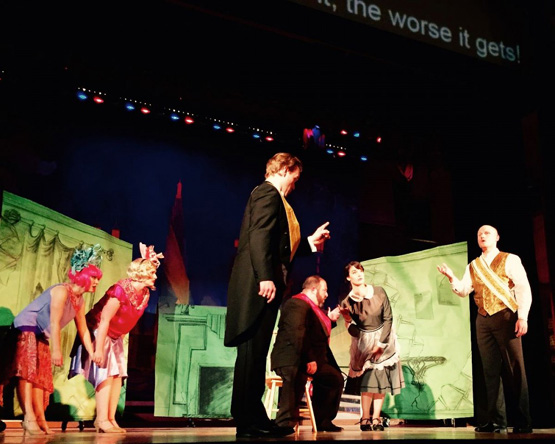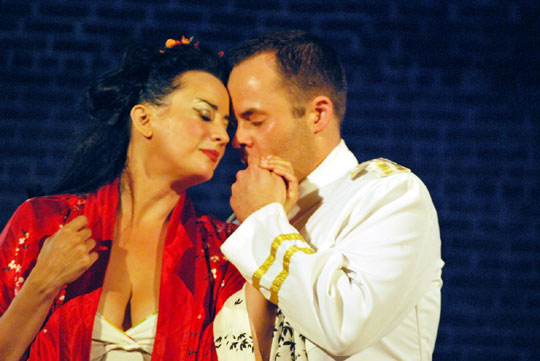Previous Festival Reviews
 La Cenerentola: Music Fest hits a high note with perfect opera
La Cenerentola: Music Fest hits a high note with perfect opera
By Nan Lincoln
During intermission for the Bar Harbor Music Festival’s live production of Rossini’s “La Cenerentola” (Cinderella), he was overheard enthusiastically telling a friend how he and his wife spent the morning climbing Cadillac, the afternoon canoeing on Eagle Lake, and now, to wrap things up, were having a blast at a live opera at the fabulous old art deco theater.
“What more could you ask for?” he asked.
Even the other audience members that night – some 300-plus strong – likely would have concurred.
Providing those high notes were three fabulous sopranos, Alexandra May, Alice-Anne Light and most especially, lovely Laura Krumm playing the Cinderella role, Angelina.
Actually, all three women were lovely. But Light and May had assumed such hilariously clownish characters as Angelina’s two graceless step sisters, Thisbe and Clorinda, that their beauty was hidden under mounds of make-up. These two almost stole the show with their awkward antics, outrageous facial expressions and chattering like a couple of battling raccoon kits.
The real wonder here is how they managed to convey shrillness and silliness while singing, but never once hit an unpleasant note.
Another scene-stealer was their father, Don Magnifico, played by bass Andy Papas. For a big man, Papas was remarkably light on his feet, bouncing about the stage like a beach ball when the Don learned the prince was coming for a visit in search of a wife.
Keith Harris as Dandini, the prince’s Valet, arrived at the Don’s household disguised as the royal bachelor. He really did steal every scene he was in. Ridiculously handsome, Dandini strutted about the stage like a peacock, preening and posturing and thoroughly enjoying his princely role as he vetted the Don’s two daughters as possible bride material for his master.
The prince himself, played by lyric tenor Zac Engle, was pretty darned cute himself. Disguised as his own valet – but in canary knickers and matching argyle stockings, he looked for all the world like P.G Wodehouse’s privileged nincompoop Bertie Wooster. Engle’s effervescent tenor was perfect for this role, which demanded some nimble singing, as well as some impressive high notes, which he handled with aplomb.
In a smaller part, bass Matthew Curran brought gravitas to his role as Alidoro. In fact, he was the only straight-man in the show. He disguised himself as a beggar to test if the members of Don Magnifico’s household had compassion. Angelina, of course, passed with flying colors, while the sisters failed gloriously with garish colors and frothy fascinators.
But no one could have stolen the show from Krumm’s Angelina, who was as delicious to look upon as to hear. She brought a plucky charm to her role as the despised third sister. Cinderella is often played as such a pitiful Pearl, but her La Cenerentola was no pushover. And talk about vocal gymnastics? Her arias were filled with trills, chirps, warbles, breath-taking glissandos, deep cello-like lows and soaring viola highs that must have ranged at least two octaves, all of which Krumm handled with the ease and confidence of a Ninja warrior princess.
Fenlon Lamb’s direction was great fun throughout, studded with brilliant comic gems, such as the interlude where all the characters on stage were suddenly transformed into steeple clock automatons mechanically weaving around and bowing to one another as they sang. Other moments included the rotund El Magnifico and Dandini wrestling over a chair and the two sisty uglers (as Spooner would have termed them) serving as spotlights from the pit by shining flashlights beams on a cardboard limo transporting the prince through a hand-held forest as he sought his lover.
As ever, Cara Chowning was a marvel, accompanying this fine and funny crew on piano without a hitch, even when various characters joined her on the bench.
The set design worked nicely with the Criterion’s own art deco backdrop. If the princely palace was supposed to look as if it had been decorated by tweenies for junior prom with giant gold and tissue paper flowers, it worked.
The Criterion, with its newly upholstered seats and new paint, actually looks like a million dollars these days, or more aptly $2,000,000, which, according to it’s manager Michael Boland, is what an anonymous donor contributed toward the purchase and renovation of the wonderful old theater. And while they still have to work out issues with the movie sound system, for these live unamplified shows, the acoustics couldn’t be better, making for a perfect ending to a perfect summer day in Bar Harbor.
The acoustics also should be excellent at the Congregational Church next Thursday, July 16, when the Ardelia Trio performs the next Bar Harbor Festival concert.
Madame Butterfly Hits High Note
Written by Nan Lincoln
www.mdislander.com
 BAR HARBOR — It was worth the wait.
BAR HARBOR — It was worth the wait.
Shana Blake Hill as Madame Butterfly and Scott Scully as B.J. Pinkerton earned a standing ovation.
Photo by — FRANCES FREMONT-SMITH
That was pretty much the consensus for those who sat in the audience at the Criterion Theatre the night of July 16 and waited patiently during the first act of Madame Butterfly for soprano Shana Blake Hill in the title role to finally appear in her scarlet kimono and trill her first spine-tingling notes. It was well worth the wait.
For two-and-a-half wonderful hours Ms. Hill and the rest of the fine cast of this year’s Bar Harbor Opera Theater production kept the audience thrilled, enrapt and finally heartbroken as the tragedy played out amid familiar and favorite arias and duets. And, they were sung in manner that would have had audiences in any grand opera house in the world in awe.
Enough can’t be said about Ms. Hill’s performance. From the moment she appeared on stage as a girlish, giddy, teenage geisha, besotted by the handsome U.S. naval officer who has arranged to marry her, she won the battle for our hearts and minds. It was devastating to see her happiness, knowing that her sailor’s heart wasn’t completely on board; knowing that for him the union is just a happy diversion while he is stationed overseas until he returns to America to find a “real” wife.
Lyric tenor Scott Scully as Lt. B.F. Pinkerton was excellent in a difficult role. At first he appeared as a devil-may-care, whiskey-swilling cad, who ignores the advice of the American consul (soberly played by baritone Ryan Taylor) who cautions him to be careful of the young geisha’s heart. Clearly, this guy was only interested in having a pretty bedmate for a few years. But then Mr. Scully successfully, in a very fast turnaround, managed to convince us that Lt. Pinkerton did have true feelings for the girl. This transformation is vital as, otherwise, the beautiful duet sung as their marriage is on the verge of being consummated would have appeared more like statutory rape than a love story.
Still, it’s hard to forgive Lt. Pinkerton when, in Act II we find Butterfly five years later alone and destitute waiting for her “husband” to return after a three-year absence.
Although her maid and confident Suzuki – beautifully sung in a rich mellow mezzo-soprano by Kyung Kim – tries to tell Butterfly that it is unlikely she will ever see Lt. Pinkerton again, Butterfly refuses to hear it, and in the opera’s most heart-rending, poignant moments she tells Suzuki exactly how the long-awaited reunion will occur. Ms. Hill sang and acted this aria so evocatively we could almost see the wisp of smoke rising from the funnels of the ship as it entered Nagasaki Harbor, hear the cannon blast announcing its arrival, and see his small figure start the ascent to the hilltop house they once shared and where Butterfly waits patiently and confidently for him to reach her door and start up their life together again.
This reverie ended in one of the loveliest notes ever heard in the Criterion Theatre — sung softly but powerfully as Butterfly walked off stage. It lingered like a, well, like a butterfly, hovering in the air, long after she was gone.
But this opera is a tragedy, so of course Butterfly’s vision is not at all how things turn out. Lt. Pinkerton, the creep, does return – but only to claim the child he has just discovered Butterfly gave birth to after his departure. Heartbroken and feeling dishonored, Butterfly relinquishes the boy – adorably and seriously played by Ian Carey, wearing Crocs. Then she falls on her sword.
Once again Ms. Hill demonstrated her considerable acting chops, creating a tense and horrifying moment as Butterfly commits her fatal cut, then hears, too late, Lt. Pinkerton calling her name.
It took the distressed audience a few moments before it could collectively gather its wits and offer up a well-deserved standing ovation.
Fenlon Lamb, who directed, also deserved a standing ovation for putting this whole thing together in about a week, with just enough costuming and staging to make it all feel like the real deal. And piano accompanist Cara Chowning would have been wonderful to hear even if the singers had failed to show up.
In smaller but important rolls, Tim Culver provided some comic relief as the unctuous marriage broker Goro, and Christopher Dickerson was properly glowering and menacing as Butterfly’s angry uncle Bonze and as her rejected suitor, Prince Yamadori. A small ensemble of David Schildkret’s Mount Desert Summer Choral handled the chorus numbers admirably. That group’s concert, by the way, is coming up Saturday and Sunday, Aug. 7 and 8.
And finally, another standing ovation was earned by the MDI community for showing up some 500 strong for this fifth annual Opera Theatre performance. It seems the community has finally caught on that this really is a premier musical event. Unless one happens to live next door to The Met in New York City, it was a rare opportunity to hear some of the finest young operatic talents in the country. Perhaps the Bar Harbor Music Festival can bring us another opera next year, but make it a comedy, please, because after this one, we could use a laugh.
Brass offer tempting fare
Review by Peter Friend
Used with permission, Mount Desert Islander
BAR HARBOR—Brass Venture offered up a mouth-watering opening night last Friday for the month-long Bar Harbor Music Festival, combining virtuosity and good humor with superb ensemble playing as they ran the musical gamut from Bach to blues at the Bar Harbor Congregational Church.
Immaculately turned out in evening dress, the talented Boston-area group had its audience entranced as the group breathed life and vigor into the sometimes staid medium of brass music, showing off considerable talent while obviously having fun. For two hours the musicians created a magical “musical trilogy” between artists, audience and composer as described by festival director Francis Fortier.
“The butterflies for opening night will never cease. When you lose that, retire,” quipped Mr. Fortier in his introduction,He told the audience he decided to invite Brass Venture after listening to just three minutes of a CD and described the ensemble as “absolutely charming.”
The group then launched into a dazzling piece by musical mentor Eric Ewazan, composer-in residence at the Julliard School of music, who first encouraged the members to play together. The group set the tone for the evening with the precision of the ensemble work and the sheer verve of performance. Trombonist Jamison Clark then introduced his colleagues Jeffrey Hoefler(trumpet), Chip Halt (tuba), and married couple Hilary Ledebuhr(French horn) and Erich Ledebuhr(trumpet).
Apart from the Ewazan piece, the first part of the program consisted of classical works arranged for the quintet, rather than composed specifically for a brass group.
For a piece by Giovanni Gabrielli, designed to be played from different parts of St. Mark’s Cathedral in Venice across the heads of the audience, the group members stationed themselves around the church to replicate the “surround sound” effect. Two Bach pieces, arranged by Chip Halt, gave the musicians a chance to show off their virtuosity. Five movements from Mussorgsky’s Pictures at an Exhibition,” also arranged by Mr. Halt, perfectly captured the mournful Russianism and grandeur of the work and provided an interesting contrast to piano virtuoso Eleonor Bindman’s performance of the work for the Arcady Music group earlier this year.
Brass Venture changed gears after the interval, playing modern music, much of it written for a brass quintet. As Jamison Clark said, “we have left Bach far behind”. They provided two world premier performances—first for “Quintet No. 2” by Thomas Hojnacki, with movements named “Fanfare”, “George of Arabia,” “Lament for the dead in Iraq,” “dead cow” and “Howard Dean’s march on Washington,” then for Paul Bettancourt’s “Interstellar Fantasy for Brass Quintet.” This piece described a trip through outer space, combining a 1970’s brass sound with Souza influences.
The gentlemen in the group then discarded their tailcoats, and played wonderful versions of “Sweet Georgia Brown,” “Beale Street Blues,” and “Livery Stable Blues” — which included a blues French horn solo — possibly a first.
The group took turns soloing on “Amazing Grace” before receiving a loud standing ovation and calls for an encore.
The festival, now in its 38th year, offers 11 concerts and recitals between now and August 1.
Tickets and information are available at the Rodick Building, next to the Post Office, Testa’s restaurant, The Bar Harbor Inn Gift Shop and Bar Harbor Regency Holiday Inn. Phone bookings can be made at 288-5744.
Information about Brass Venture and details of their CD are available at www.brassventure.com
Performances this week include the Tchekmazov-Nuzova Duo, on Friday July 9 at 8:15 at the Bar Harbor Congregational Church on Mt. Desert Street and a tea concert by soprano Malinda Haslett on Sunday, July 11 at 4pm at the Balance Rock Inn, 21 Albert Meadow.
